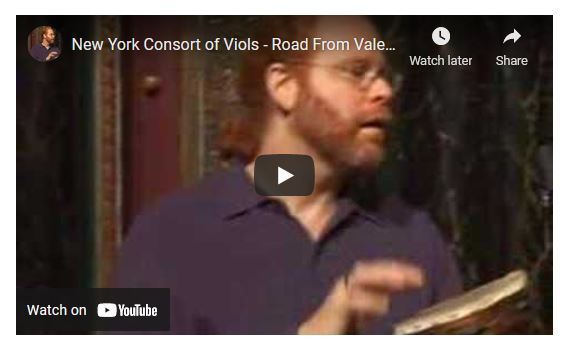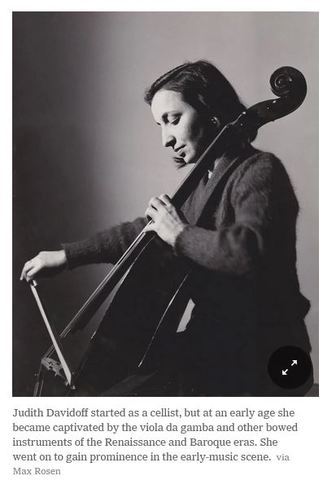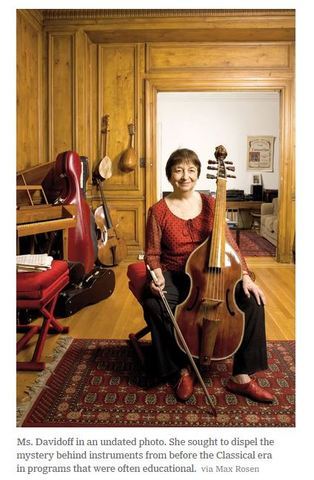A master of the viola da gamba and other stringed instruments, she was a central part of the early-music scene.



By Neil Genzlinger
Jan. 6, 2022
Judith Davidoff, who mastered an assortment of stringed instruments not widely played for centuries, especially the cello-like viola da gamba, and became a leading proponent and player of early music, died on Dec. 19 at her home in Manhattan. She was 94.
Her children, Max Rosen and Rebekah Rosen-Gomez, confirmed the death.
Ms. Davidoff was trained as a cellist, and she was a good one.
“She was an absolutely amazing sight reader,” Lisa Terry, a fellow musician who learned from her, said in a phone interview. That skill had Ms. Davidoff in demand for recording sessions.
But while she was studying the cello as a teenager, something caught Ms. Davidoff’s eye.
“Inevitably as I got involved in the repertoire, I began to notice music for an instrument called the viola da gamba,” she told The Intelligencer Journal of Lancaster, Pa., in 1983. “I got curious as a teenager to know what this instrument was.”
That instrument was a bowed and fretted fiddle, held mostly between the legs, that first became popular in the late 15th century and flourished throughout the Renaissance and Baroque periods.
Curiosity led to a passion for early music and the instruments used to perform it. First in Boston, then in New York, Ms. Davidoff became part of an early-music scene that was gaining momentum in the middle of the last century and became a major force in classical music, even influencing how works from later periods were performed.
Over the years she was a member of numerous ensembles, including the Boston Camerata, the Cambridge Consort and New York Pro Musica. She was a founding member of the group Music for a While and, in 1972, created the New York Consort of Viols. She also played vintage instruments on numerous recordings.
She liked to devise programs that, in addition to showcasing the music, had an educational element. One program she created with the Consort of Viols, for instance, was called “The Road From Valencia” and featured Renaissance works by Jewish composers and viol players who, having been expelled from Spain in 1492, made their way to Italy and, in some cases, to the court of Henry VIII in England.
Her knowledge of instruments of yore was vast. With a nod to Alfred Hitchcock’s “The 39 Steps,” she once worked up an educational program she called “The 39 Strings” featuring seven vertically held bowed instruments that had come into and out of fashion — the rebec, the vielle, the two-stringed Chinese erhu, medieval fiddles and more. Collectively, the seven instruments had 39 strings and represented eight centuries of music.
“Our musical experiences have been enhanced by each successive period and style,” she told The Northern Valley Suburbanite when she presented the program in Englewood, N.J., in 2002.
Judith Davidoff — she continued to perform under her own name after her marriage to Sumner Rosen in 1949 — was born on Oct. 21, 1927, in Chelsea, Mass. Her father, Sidney, was a composer and musician, and her mother, Ruth (Feinstein) Davidoff, was a teacher.
Judith started her musical studies at 7, and at 18 she performed as a cello soloist with the Boston Pops. She studied at Radcliffe College and the Longy School of Music, earning a soloist diploma.
A few years after she first became curious about the viola da gamba, she heard the early music group the Boston Camerata and spoke to some of its members after the concert, expressing her interest in learning the instrument. One member was leaving the group and offered to sell Ms. Davidoff her instrument; another offered to teach it to her; a third told her she could probably join the group once she mastered it.
“I had the instrument and the incentive all at the same time,” she said in the 1983 interview.
While living in the Boston area she was able to practice and perform on the period instruments in the collection of the Boston Museum of Fine Arts. In 1964 she relocated to New York, in part to play with Pro Musica.
The curiosity that first led Ms. Davidoff to early music stayed with her for her entire career. In 1971, for example, when she was already established as an early-music performer, she took a course in how to dance the court dances of the Baroque era. Learning the steps gave her new insights into how the accompanying music should be performed.
“This course has revolutionized the feeling of the whole music of this period for me,” she told The New York Times.
She was also always on the lookout for new discoveries.
“She toured all over the world looking for instruments to play,” Ms. Terry, a past president of the Viola da Gamba Society of America, said. In addition to teaching at Sarah Lawrence College and other institutions, Ms. Davidoff served residencies in Turkey, where she learned a stringed instrument called the kemence, and Taiwan, where she learned the erhu.
Though the instruments she played may have been from earlier eras, she believed new works could and should still be created for them.
“One powerful impact Judith had was her fierce devotion to getting living composers to write for the viola da gamba,” Ms. Terry said. In her late 60s, Ms. Davidoff earned a Ph.D. at the Union Institute (now the Union Institute & University), based in Cincinnati. Her dissertation, “The Waning and Waxing of the Viol,” included both an in-depth history of the instrument and a catalog of music written for it in the 20th century.
Ms. Davidoff’s husband, a political economist noted for his work on social issues, died in 2005. In addition to her children, she is survived by a sister, Edith Muskat; two grandchildren; and a great-grandson.
Ms. Davidoff knew that some people might need a little help learning to appreciate the music she liked to perform.
“The process of courting the audience is a tricky one,” she wrote in her dissertation. “Listeners, except for the ardent early-music groupies, often feel insecure about their lack of preparation, and the right tone must be found — the mystery of the unknown must be broken without doing the music an injustice or patronizing the patron.”
https://www.nytimes.com/2022/01/06/arts ... -dead.html